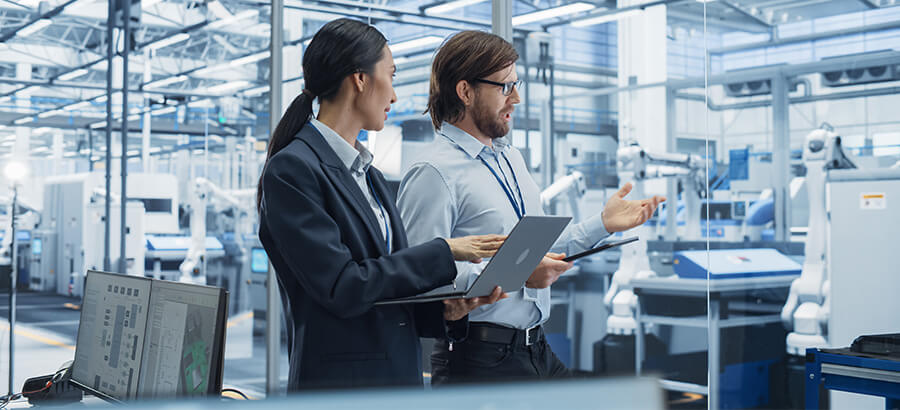In manufacturing, performance improvement, cost reduction and process optimization are crucial. Manufacturers have adopted innovative solutions and technologies to deal with these issues. Artificial intelligence (AI) and machine learning (ML) in manufacturing ERP have recently added a new realm of technology that can address the complex operations found in manufacturing.
There is no question that AI and ML will have important roles in shaping the future of manufacturing ERP. Given the recent developments in computing and the ability of AI models to learn and adapt, AI and ML will increasingly be used to improve efficiency, productivity, and creativity across manufacturing.
What is AI and ML?
AI is the term for computer software that gets information about the environment and takes action in response to that information, and objectives that are set. AI systems get better and more accurate as they collect and analyze more data. AI can perform tasks often performed by humans with a higher degree of accuracy and intelligence. While it does not replace human intelligence, the insights that come from using AI can significantly augment human capabilities.
ML is a form of AI that enables a system to learn from data rather than through explicit programming. As the ML process trains on data, it is then possible to produce more precise models based on that data. An ML model is the output generated when you train your ML algorithm with data
Benefits of AI and ML in manufacturing ERP
Maintenance, process control, productivity, and supply chain optimization are some of the common areas where AI and ML can make an impact on manufacturing ERP.
Industrial engineers have used heuristics-based rules, what-if analysis, and physics-based simulation to get predictive and prescriptive insights for several years. AI and ML can now augment and enhance those heuristics to get results quicker and provide more in-depth analysis to help manufacturers improve how they monitor and control processes and operations.
AI and ML in production control
- ML models trained on operational data from an ERP can help achieve significant benefits in key operational metrics like throughput, and OEE.
- Combining real-time data from connected machines with AI and ML can provide insights into machine loads, streamline the production process and improve production scheduling.
- AI and ML can analyze machine data from a manufacturing ERP to predict when equipment might fail, allowing for timely maintenance and reducing downtime.
- AI can help manufacturing ERP systems in optimizing the use of materials and resources, reducing waste and lowering costs.
AI and ML in inventory and supply chain management
- Applying AI to demand forecasting can reduce forecasting errors and costs by optimizing inventory levels to match demand through analyzing data from an ERP on sales history, customer behaviour and industry patterns.
- By analyzing external data, AI can identify potential supply chain disruptions, and suggest alternative suppliers.
- AI can help to solve complex delivery constraints and improve logistics costs by finding patterns in data from intelligent sensors on trucks and packages.
- By applying AI to shipping and supplier data, manufacturers can evaluate supplier performance, and uncover which shipment centres are most accurate in catching errors
AI and ML in quality management
Using AI to evaluate component images in the production line can identify in real-time deviations from quality standards, improving ERP quality management and testing.
Other benefits of AI and ML for manufacturers
- Using the large amounts of data in the manufacturing ERP, AI-powered decision support tools can analyze data to find patterns and trends in seconds, helping managers make informed decisions quickly.
- AI algorithms can simulate a variety of scenarios, evaluate potential outcomes and identify the most effective strategies.
- AI integrated with tools like ERP can provide more personalized experiences by analyzing user roles, past data interactions and common workflows.
- AI models can also improve customer service by personalizing interactions through analyzing customer data.
Manufacturing benefits of Generative AI
Generative AI, a subset of AI, can generate new content or designs without needing training data. Unlike traditional AI which primarily analyzes existing data, generative AI learns the underlying patterns and structures of input data to produce similar but new outputs. In manufacturing, this can be the creation of optimized design alternatives for parts or products.
Manufacturers are beginning to employ generative AI in their product design and development. By inputting parameters and requirements into generative design software, companies can obtain optimized design solutions that not only meet their criteria but also present options they might not have considered.
Generative AI can also be used for information summarization. In this way, it could help with the skilled labor shortage in manufacturing by assisting production workers in learning how to use their ERP to improve understanding and solve problems.
Where to Start with AI and ML
There has been so much hype around AI since the launch of ChatGPT at the end of 2022 that many manufacturers may consider they are being left out of the AI revolution. That is not the case. An article in the Havard Business Review noted that as much as 80 percent of AI projects fail. In order to ensure a greater chance of success, companies need to do three things.
- Choose a business case that has a narrow scope, for example, demand forecasting.
- Select the right tool. An ML solution is more appropriate for demand forecasting than generative AI.
- An AI model is only as good as its data. Manufacturers must make sure they have high-quality data from their ERP as well as external data, and have it in the right format to get the results they need from their AI project.
Key benefits of AI and ML in manufacturing ERP
Three key benefits of using AI and ML in manufacturing ERP are that it can trigger significant improvements in productivity, efficiency, and operational excellence. However, while the benefits of AI and ML in manufacturing are clear, when it comes to the adoption of AI, there is still much for companies to learn and understand first.







